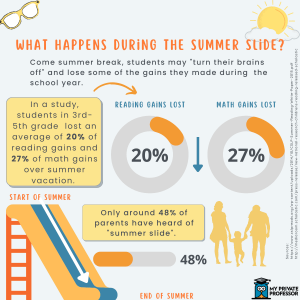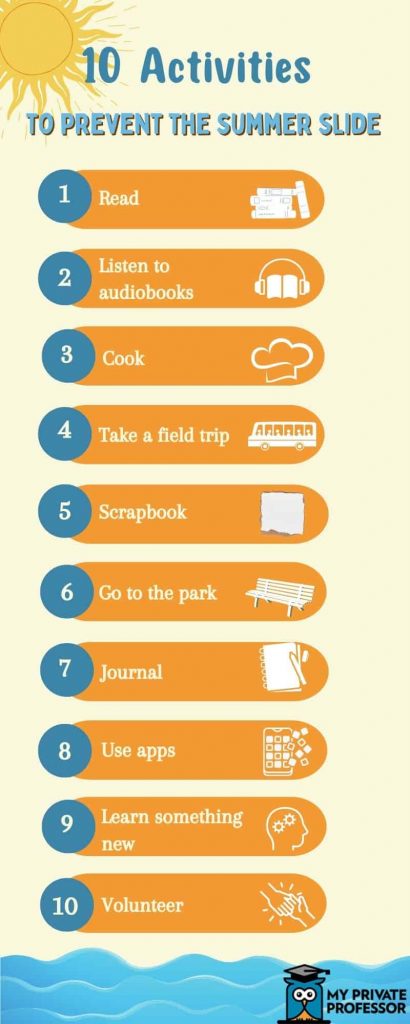Slides are fun—except when you’re dealing with the summer slide.
When summer rolls around, students are thrilled to have more time to get outside, play with friends, and just be free. Plus, you may have a lengthy bucket list you’re ready to start going through.
But it’s important to remember that the summer is a period in which students often regress academically, losing knowledge they’ve gained during the year. Introducing: the summer slide.
In a 2020 study, researchers determined that the average student lost 17-34% of the previous year’s learning gains throughout summer break. In addition, they found that students who lose gains during summer break are more likely to lose gains in future summers.
This year, it’s even more important than usual to recognize the potential impacts of summer slide. That is, students might need more educational support when you take into account the all-too-common pandemic learning losses in conjunction with the typical summer slide. 
Schools have struggled to function consistently due to COVID-19, the evolving learning environments, and quarantine protocols. And the consequence is that students continue facing learning gaps and challenges (on top of summer slide).
Although the pandemic’s spread—in most areas across the country—has decreased, research tells us that we still need to recognize its long-lasting effects.
Often, when students hear that they may have to do some form of—horror of horrors!—learning over their well-earned break, they don’t take it so well. But, they also may be jumping the gun and assuming that “learning” means they have to spend their entire break locked in a classroom.
Thankfully, this isn’t the case.
There are plenty of ways to avoid the summer slide while still making time to cross many of those items off your summer bucket list.
1. Read!
Summer break is a great chance to catch up on reading for YOU. Rather than going through your rumpled copy of A Midsummer’s Night Dream with a highlighter handy and pages of notes, you can finally read for pleasure.
Reading books over summer vacations can help mitigate the chance of regressing in reading comprehension and achievement. This can be beneficial both for students struggling in the area, and students doing just fine.
In fact, research shows that reading is linked to preventing the summer slide for students; specifically, reading just four to six books over the summer can prevent a decline in reading achievement.
2. Or, listen to audiobooks
If reading during the summer seems like too much of a chore, maybe audiobooks are the way to go. Although it’s not the same as reading, listening to audiobooks still provides benefits related to reading comprehension.
When you listen to an audiobook, you’re still engaging your brain—you still have to get from point A to point B, and make sense of a storyline or plot. Essentially, you’re still forcing your brain to participate in complex cognitive processes—and these are crucial for preventing the summer slide and keeping your brain sharp.
3. Cook
Although whipping up a heaping pot of spaghetti and meatballs may not seem educational, think again.
In reality, math and reading don’t always involve sitting, hunched over a desk in silence! Following instructions and directions, and understanding the different measurements in a recipe is a great way to stay on your toes and keep your math, organizational, and time management skills sharp.
4. Take field trips
Taking a field trip is not only fun, but by nature, educational. When walking around an interactive and stimulating space filled with new knowledge, you’re bound to learn. Plus, it’s a fantastic way to integrate some family bonding time into your summer. Or, you can go with a friend and catch up on what they’ve been doing over their break.
You may even find it gratifying to bring along a journal to note the highlights and reflect on what you’ve learned.
Educational field trips can inspire imagination, creativity, and critical thinking—essentially, you’re ensuring the brain muscle keeps doing its thing, which is key for preventing learning loss.
Fun field trip ideas:
- Art museum
- Zoo or aquarium
- Local park tour
- Farm or garden trip
5. Make a scrapbook
If you’re into crafts, scrapbooking is a perfect summer activity—and another opportunity to stretch the brain muscle. Although it doesn’t innately relate to the topics you were learning in school, scrapbooking requires patience, creativity, and imagination. 
Plus, you can add narrations and/or captions, which requires practicing reading and writing skills.
6. Hit the park
Getting out of the house and into the park is not only a great way to soak up the sun, but it’s also a wonderful opportunity for some unconventional learning. After all, there’s an endless list of what you can learn outside of the classroom.
Going out to explore the natural world is one of the best ways to have a hands-on science “class”. And you can go in so many different directions. Maybe you and your family will try to observe which plants are growing and which have suffered the most since the summer has begun. Or, maybe you go cloud-watching and see if you can identify the specific types.
Once you start looking into it, you’ll see that the list of educational summer outdoor activities goes on and on.
7. Start journaling
The summer is a time for rest and relaxation—and reflection. And what better way to reflect than to start journaling? Journaling is an all-around great habit: it helps reduce stress and anxiety, can boost your mood, and encourages you to identify and acknowledge emotions.
Not only is journaling good for your mental health, but it helps keep your brain in shape. Over the years, researchers have found that journaling can boost memory and comprehension, increase working memory capacity, and in turn, improve cognitive processing.
On top of all this, regularly journaling helps prevent regressions in reading and writing.
8. Download educational apps & games
With the help of modern technology, we’re lucky to have an almost endless list of useful education apps and games at our fingertips. Plus, the last two years of COVID-19 brought us many, many more.
Some of our favorite online educational apps include:
These apps are valuable for students, since they encourage brain activity—yet, they aren’t just lessons and lectures. The apps provide fun and stimulating ways to learn throughout the summer.
9. Learn something new every week
Before you know it, the summer will fly by. While it’s tempting to relish the free time and go into full R&R mode, this is also a great time to learn something new.
You can make this a fun challenge, and try to learn a new word every week and then see how often you can use them. Or maybe you try to learn about traditions from different cultures. The possibilities are endless!
10. Volunteer
If you aren’t planning to go to any programs, camp, or summer school, you may have too much free time. Plus, you’ll probably get a little lonely. Volunteering is a great way to get that social interaction you may crave—while giving back to the community and expanding your knowledge about the world around you.
So no, avoiding the summer slide doesn’t necessarily mean you have to go full-on academic boot camp mode. The summer may actually be the perfect time to do some academic soul-searching—and maybe find your new favorite pastime!
Author: Lydia Schapiro







